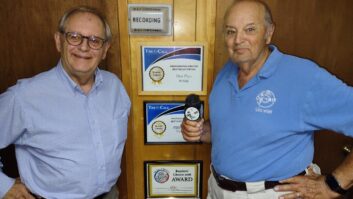When Emmis Communications spent $105 million to buy six Austin, Texas, radio stations on March 3, Wall Street didn’t exactly stand up and applaud the deal. Emmis stock took a pretty hard hit, dropping $2.50 to $17.29 the day the deal was announced.
But Emmis was undaunted by the rough reception.
“I really feel like we got beachfront property,” said Rick Cummings, president of Emmis’ radio group. “Wall Street kind of punished us for it. They wanted to see us get our debt down a little further before we bought anything. But, I’ll tell you, I can’t imagine buying a better cluster.”
As clusters go, this one is particularly notable. Not just because it was the top-billing group in Austin in 2002 (revenues of approximately $23.5 million and cash flow of around $9.7 million). Not just because the stations account for half of Austin’s highest-rated dozen (Arbitron, April 3).
These stations are particularly notable because they belonged to the family of Claudia Alta Taylor Johnson, a woman known to one and all. If her name doesn’t immediately ring a bell, perhaps it’s because Mrs. Johnson is more commonly known by her nickname Lady Bird.
First family of Austin radio
The former First Lady got into the radio business in Austin in 1942 when she took $17,500 in inheritance money and bought KTBC(AM), a low-power, daytime-only station. The story goes that her then-congressman husband, Lyndon Baines Johnson, used his legendary powers of persuasion to gain FCC approval for a full-power license for the station.
Doing everything from mopping the floors to bringing in more advertising, Lady Bird nurtured LBJ Broadcasting Co. into a local media force. In 1952, the company founded Austin’s first television station, KTBC(TV), which was sold 21 years later to Times-Mirror. In 1960, KTBC(AM) was joined by an FM counterpart, and in 1973, the radio stations incorporated the family’s famous monogram, changing their call letters to KLBJ.
In 1997, LBJ Broadcasting became LBJS Broadcasting when the family entered into a partnership with Sinclair Telecable, a Virginia-based company. Sinclair, run by brothers Bob and David Sinclair, owns stations in Norfolk, Va., and Santa Rosa, Calif.
At the time of the Emmis deal, LBJS Broadcasting included both KLBJ stations, plus KGSR(FM), KROX(FM), KEYI(FM) and KXMG(FM).
Offers had been made for the stations in the past. Ian Turpin, who is married to Luci Baines Johnson and serves as president of LBJ Holding Co., which oversaw operations of the stations, said, “With radio consolidation hot and heavy, we’ve had several suitors over the years, but we chose not to sell.”
However, this time, the situation seemed to match the stations with a company the Johnson family felt understood the unique Austin market and would value the people who work for LBJS Broadcasting.
Nonetheless, Luci Baines Johnson describes her family’s decision to sell the group as agonizing.
“Bittersweet seems to be the operative word. We recognize that this was an opportunity that made sense for our family for a multitude of reasons. But it was a very difficult decision.
“I do not remember life before radio. KLBJ and successive stations have been an important part of my life. I’ve gone to weddings, baptisms, bar mitzvahs, first communions and funerals of many, many, many of our radio family. We played together, prayed together, worked together and worried together. It’s been very much a family operation.”
Mixed feeling
Scott Gillmore, vice president and market manager for LJBS Broadcasting, said word of the sale was received with mixed emotions.
“These stations have been in the Johnson family for 60 years and there are many employees who have a long association with the family. But at the same time, the staff and stations are thrilled because the Sinclair family is still going to be a partner in this.
“We feel that the Johnsons and Sinclairs picked a great partner. Emmis is a big enough company to give us some great resources, but small enough that we’re not going to get lost in the shuffle.”
In the deal, Emmis is buying LBJ’s stake in the partnership. Emmis also gets the assets of KEYI from Sinclair, which will give Emmis a 50.1-percent interest. Sinclair retains board representation, but Emmis will manage day-to-day station operations and has an option to buy Sinclair’s stake in five years.
Desirable
Cummings said that Emmis is delighted to gain such a strong presence in the Texas capital.
“We had always coveted Austin. Our game plan is to be in the top 30 markets. Austin isn’t technically a top-30 market, but it sure acts like one. It’s market No. 42 in population, but it performs like No. 32 in terms of revenue. It’s a very desirable market.”
LJBS’s Gillmore said picking up the top-billing cluster in such a financially strong market gives Emmis “not just a foothold here, but a real footprint.”
Although Austin is new territory for Emmis Broadcasting, the company has had a presence here since 1998, when it purchased Texas Monthly, one of the nation’s top regional magazines. The combination in Austin gives them opportunities similar to those the company currently enjoys in Los Angeles and Indianapolis, other markets in which Emmis owns radio stations and city magazines.
However, Cummings says the chance for synergies was more of an afterthought than a strategic driver of the deal.
“After it was done, we said, ‘Hey, own the magazine, too! We can do all kinds of cool things.’ We don’t normally go into these situations saying, ‘Let’s try to buy radio there because we have a television station or a magazine.’ But if it turns out like it did in Austin, we’ll certainly look for some ways to cross-promote or share content.”
They won’t have to start from scratch. Texas Monthly and some of the LBJS stations have been working together for years on an informal basis. Some of the magazine’s editors and writers are regular guests on the radio stations, and some of the radio station personnel have in the past contributed to the magazine.
Evan Smith, Texas Monthly’s editor, says that more interaction between the magazine and the stations is a likely outcome of the deal, and adds, “We’re all only happy about it.”
Jody Denberg, program director and DJ at LBJS’s AAA station, KGSR, said, “Certainly we’re going to be looking for more ways to work with Texas Monthly. It’s a fantastic magazine and we’ve always viewed ourselves as kindred spirits anyway.”
Song remains the same
While there has been enthusiasm about the possibility of the magazine and stations working together more closely as a result of the deal, there has also been some concern at the stations and among listeners about whether Emmis intends to come into the market and tinker with programming.
Texas Monthly’s Smith said, “The day the sale was announced, I called Kevin Connor, who’s the morning on-air personality at KGSR, and Jeff Ward, a talk show host on KLBJ(AM), and said, ‘These (Emmis) are good guys. They’re not these media aggregators who come in and cut half the staff and change the formats and ignore what the market wants. They’re very reasonable people who know enough to trust the smart people running the entities who do the very best job they can.'”
Cummings also plays down concerns about major changes on the airwaves. He was impressed by the outpouring of concern about any changes being made to KGSR, a station with a reputation for showcasing talent drawn from the Lone Star State’s deep pool of musicians and launching many new artists to national attention.
“After this deal was announced, I got e-mail from listeners saying they hoped we weren’t messing with KGSR. That’s pretty rare to see that kind of passion for a radio station. We’ve seen the ratings. We’ve seen the passion Austin has for this radio station. We’re going to learn from you before we say anything. It truly is an original.”
KGSR’s Denberg said, “They bought our stations because they wanted to own it and they supported what we’re doing, not tear it down. I feel it’s a real blessing that if the Johnson family was going to sell us, that they sold the stations to a company like Emmis. We feel like there was an angel on our shoulders looking out for us when we landed with a company like this.”







